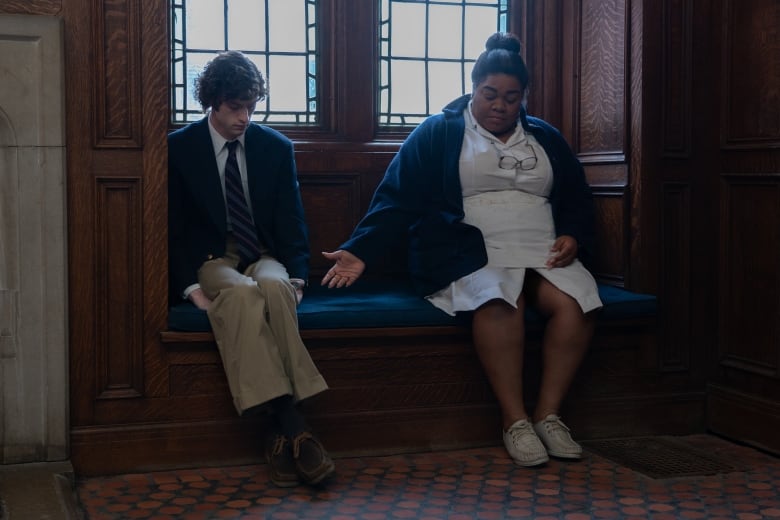The Holdovers is an odd couple Christmas movie for the ages

It’s a scene too pointed not to underpin the entire movie. Young Alex Ollerman, forced to spend the winter holidays at school, is curled over his bare hand after another kid has ripped off his mitten and tossed it in a lake.
“Twisted orphan lost your glove on purpose,” spits our actual main character, Angus Tully. “Left you with one so the loss would sting that much more.”
And with dramatic flare you could swap nearly unnoticed into Oppenheimer‘s brooding IMAX closeups, Alex runs to the icy shore, hesitates only a split second, then pitches in his remaining glove. He stares angrily, pained, directly into the camera. And then, as the folk music plays, we crossfade into the rest of The Holdovers.
What could this moment mean for the three inmates we follow at this 1970s prep school, each struggling with past mistakes and tragedies?
For Tully — facing the prospect of military school while rebelling against anything even approaching authority — it could be a warning against fighting pointless battles out of pride.
For Prof. Paul Hunham (Paul Giamatti), who barely ever ventures out of this school he once attended, it could be about getting rid of the comforting but stifling elements of life holding us back.
Or, as cafeteria manager Mary Lamb (Da’Vine Joy Randolph) pushes away any human connection in the wake of her son’s death, it could be about appreciating what you have instead of destroying yourself over what you’ve lost.
WATCH | The Holdovers trailer:
But really, if anything, the message is to throw away your need to analyze, to stop being a nerd and just and have fun watching Giamatti struggle to throw a football.
Because The Holdovers manages to be one of those rare movies that asks so little of you, while still giving much — so rich with characters and set in a living, breathing world that feels specific enough to inspire nostalgia for a time when many of its potential fans weren’t even alive.
It’s a mixed bag of wood-panelled emotions that starts as soon as the credits roll — colour-graded to wistful, late-fall perfection — recalling a time when self-contained character studies like this weren’t such a glittering rarity at the box office.
Soon, at the fictional Barton Academy, we meet Tully, played by Sessa, a newcomer so shockingly new he has no other acting credits and seemingly only one profile — a short student journalist’s writeup from the prep school Sessa himself attended.
It says Sessa landed the role after being submitted alongside 11 other schoolmates.
That lends itself to the authenticity director Alexander Payne apparently wanted; the Nebraska director told audiences at the Toronto International Film Festival he had wanted to make a film set in a boarding school but held off until someone with real experience — in this case, screenwriter David Hemingson — approached him with an idea.
Sessa steps right into that idea as the indignant but unassumingly smart Tully barrels through Barton Academy, showing off his many virtues with more than a little chip on his shoulder.
One minute, he conceals a good grade. The next, he torpedoes his classmates’ dreams of a homework-free vacation by talking back to Hunham. He provokes fights with the dorm bully only to protect a younger boy who wets his bed.
His hopes of a holiday escape crushed, he’s forced to “hold over” on campus for the holidays under the direction of Hunham — that aging type of curmudgeon who feel as old as the school they teach at, and who specifically seems to delight in taking the privilege away from the school’s privileged pupils.
They are kindred spirits, both downtrodden misfits looking to right a world that has become woefully unbalanced.
We see it in a professional argument Hunham has for flunking the son of a senator (“We cannot sacrifice our integrity on the altar of their entitlement”) and then more directly in the well-reasoned argument that “that boy is too dumb to pour piss out of a boot; a genuine troglodyte.”
And while Hunham and Tully initially butt heads, what wins out is an odd couple Christmas movie for the ages as they eventually take a generously defined “academic field trip” to Boston; a coming of age for both characters so stunted by off-screen, early life desertion.

It’s all supplemented by Randolph’s phenomenal turn as school chef Mary Lamb. She, the janitor Danny and Lamb’s son (the school’s sole student to die in Vietnam) are our only named Black characters, and each play some sort of subservient role to their white counterparts.
While that could come off as exploitative, either emotionally or literally, the treatment reads more like an honest nod to the theme of injustice, and the human capacity to overcome. Not to mention the fact that Randolph’s solid acting, punctuated by stunning shows of grief, anchors The Holdover‘s deep core.
The interdependent characters’ journeys come off as novelistic, with well thought-out plotting and setting that feels like a character all its own, reminiscent of Paul Murray’s Skippy Dies or Noah Bambauch’s equally personality-laden The Squid and the Whale.
But really, it’s just fun to watch. You do not need to try or think deeply to take something away from this movie; this perfectly choreographed world its characters are bruised by, but survive.
As it takes place in the weeks between 1970 and ’71, The Holdovers also stands as one of the vanishingly few quality New Year’s movies and itself feels a bit like turning over a new leaf. It is my new favourite movie of the year.



